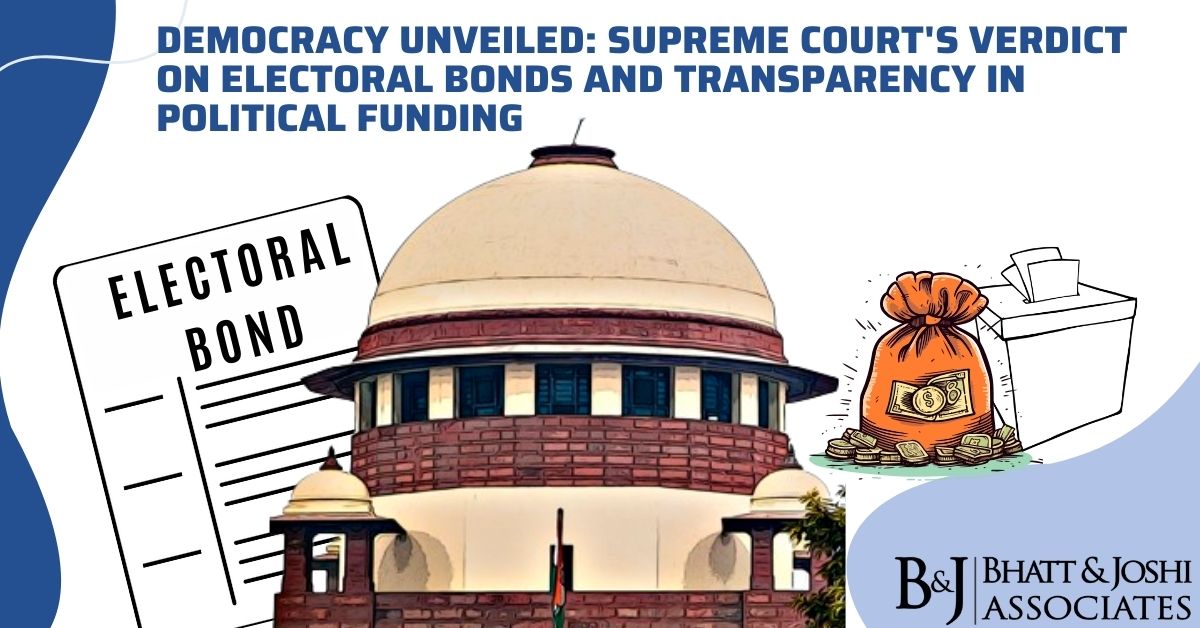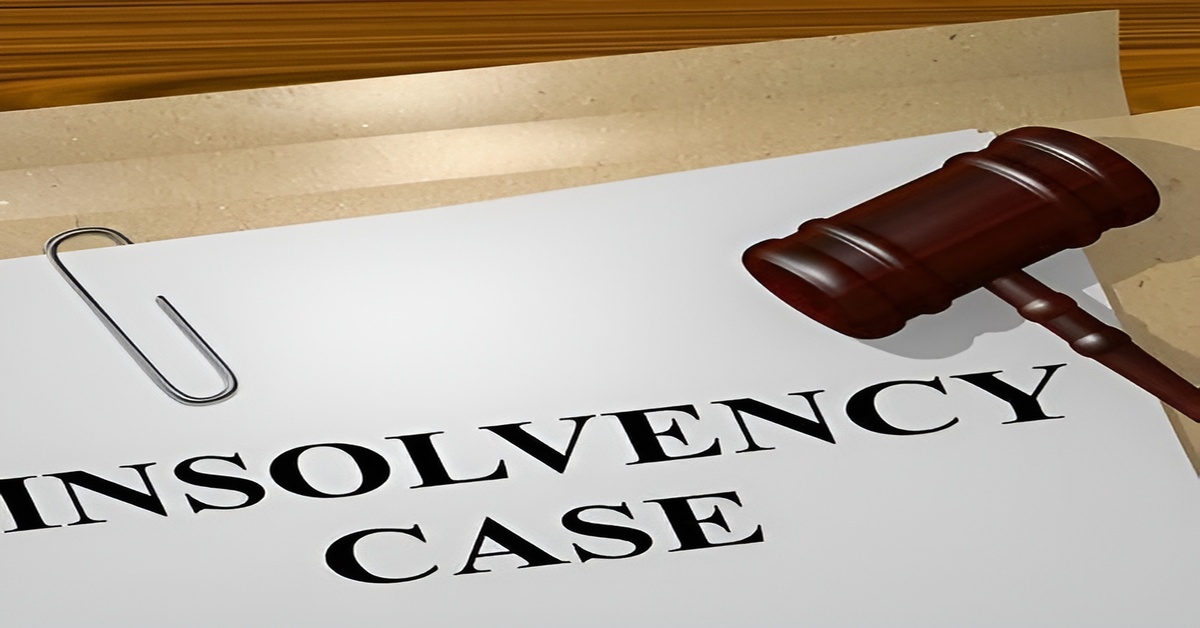Introduction
A five-judge Constitutional Bench of the Supreme Court, led by Chief Justice D.Y. Chandrachud and including Justices Sanjiv Khanna, B.R. Gavai, J.B. Pardiwala, and Manoj Misra, delivered a historic verdict on February 15, in the case of Association for Democratic Reforms & Anr. v. Union of India & Ors. declaring the Electoral Bond Scheme (EBS), 2018, to be unconstitutional. This decision was a landmark in the history of the Supreme Court. This verdict was based on the fundamental question of whether or not the EBS, which was created to guarantee anonymity to corporate contributors who contributed to political parties, was in accordance with the fundamental concept of ensuring free and fair elections, which is a cornerstone of the Indian Constitution.
Transparency and Right to Information
The panel of judges conducted a thorough investigation into the matter by determining whether or not the refusal to reveal the identity of the contributions violated the right of the voters to receive information. With the help of previous cases that established the right to information about election candidates in accordance with Article 19(1)(a), the court logically extended this concept to include information about political parties. This crucial extension emphasised that political parties could no longer argue exemptions from transparency and accountability under the Right to Information Act. As a result, the public’ right to be informed about the financing sources of the political entities they support was strengthened as a result of this expansion.
Upholding Democratic Ethos
This ruling was a defining milestone, as it posed a challenge to the established norms that surround political fundraising and put light on the constitutional requirement that the election process be conducted in an open and honest manner. The careful extension of the right to information by the court to include political parties is an example of a key step towards removing practices that are opaque in the realm of political fundraising. As a result of the court’s decision to dismantle the Electoral Bond Scheme, not only was a potential threat to the democratic ethos addressed, but the court also reaffirmed the notion that citizens have the right to know and evaluate the financial backing behind political bodies that are seeking their support.
Balancing Anonymity and Expression: Electoral Bond Verdict
The verdict of the court, in essence, stands as a beacon of accountability, ushering in a new era in the funding of elections in India, one in which transparency is respected as an essential component of democratic governance. At the same time that this verdict reverberates as a trumpet cry for ethical conduct in political fundraising, it also ensures that the democratic ideals that are written in the Indian Constitution continue to be durable and untainted.
Linking Right to Information and Freedom of Expression
This essential portion of the Supreme Court’s discussion centred on the question of whether or not the provision of anonymity to corporate donors, which is a crucial component of the Electoral Bond Scheme (EBS), could be considered a legitimate restriction on the freedom of expression that is provided by Article 19(1)(a) of the Indian Constitution. Despite the fact that the phrase “public interest” was not specifically stated as a cause for restriction under Article 19(2), the Union of India argued that the purpose of this anonymity was to reduce the influence that black money had on the election process.
Proportionality and Alternatives
In the process of analysing this argument, the Constitutional Bench took a nuanced approach, highlighting the fact that, among the rights outlined in Article 19, the only right that could be restricted in the interest of public welfare was the freedom to practise any profession or carry on any occupation, trade, or business (Article 19(1)(g)). The fact that the court did not agree with the viewpoint taken by the Union of India demonstrates that it is dedicated to providing a careful interpretation of constitutional principles.
Legal Analysis: Electoral Bond and Voter Information Rights
The court established a crucial connection between the right of voters to be informed and the freedom of expression by elaborating on the fact that the right to information about political parties is a provision that falls under Article 19(1)(a). It was essential to evaluate this link while determining whether or not the anonymity clause in the EBS could be seen as a restriction that could be considered acceptable. In light of the fact that only Article 19(1)(g) permits such limits, the court maintained that the public interest, as envisioned in Article 19(2), could not be invoked to justify anonymity.
Immediate Actions for Accountability
This section of the judgement shows the rigorous identification of constitutional boundaries that the court has adopted, as well as the meticulous analysis that has been taken to the arguments presented by the government. Through the reaffirmation of the limitations on restricting fundamental rights and the insistence on a clear nexus between restrictions and public interest, the court demonstrated its dedication to upholding constitutional values and maintaining the delicate balance that exists between individual liberties and the broader interests of society.
Electoral Bond Conclusion: Ensuring Transparency
This landmark judgement, in essence, constitutes a huge step towards bolstering openness and accountability in political fundraising, which is in line with the fundamental principles that are written in the constitution. A critical move has been taken by the court in the direction of protecting the integrity of the election process and upholding the democratic ideals that form the basis of the Indian political system. This step was taken by challenging the deficiencies of the election Bond Scheme and addressing concerns regarding unrestricted donations.
Our Comments on Electoral Bond Scheme
The conclusions of the Constitutional Bench regarding the Electoral Bond plan (EBS) highlighted the inadequacies of the plan as a mechanism to prevent the use of black money in political finance. The bench gave serious consideration to several alternatives for contributions that were less than or greater than 20,000 rupees, with a particular emphasis on the necessity of solutions that minimise the impact on the right to information. The notion of proportionality, which is a legal tenet that is frequently cited in circumstances that threaten fundamental rights, served as the guiding premise for this evaluation. The ruling of the court not only brought to light the fact that the EBS was not capable of accomplishing the goals it was designed to accomplish, but it also brought to light the significance of striking a balance between opposing interests in order to protect constitutional rights.
In addition, the bench was responsible for conducting an in-depth analysis of recent modifications that made it possible for political parties and firms to make limitless contributions. This analysis revealed that there is a potential risk of quid pro quo relationships between corporations and political bodies. The court has made it very clear that the measures in question are in direct opposition to the principles of free and fair elections as well as political equality. This particular component of the judgement highlighted the court’s dedication to protecting the fundamental ideals of democracy, which include ensuring that the political process continues to be open, accountable, and free from undue influence.
In response to these findings, the court issued orders to prohibit the sale of electoral bonds and demanded the filing of details surrounding the encashment of these bonds to the Election Commission by the deadline of March 6. The Election Commission, on the other hand, was given the directive to post this information on its website by the 13th of March. In order to ensure accountability and openness in the election funding process, these recommendations serve as immediate actions to be taken.













